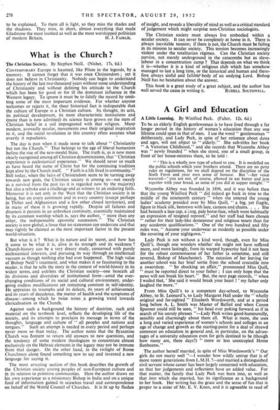What is the Church ?
The Christian Society. By Stephen Neill. (Nisbet. 17s. 6d.) CONTEMPORARY Europe is haunted, like Pilate in the legends, by a memory. It cannot forget that it was once Christendom yet it does not believe in. Christianity. Nobody can begin to understand the history of the last two thousand years without some understanding of Christianity and without defining his attitude to the Church which has been for good or for ill the dominant influence in the Western legacy. To ignore it must be to falsify the record by omit- ting some of the most important evidence. For whether anyone welcomes or rejects it, the sheer historical fact is indisputable that the culture of Europe is a Christian culture. Its thought, its acts, its political development, its most characteristic institutions and (more than is now admitted) its science have grown on the stem of Christian belief in a soil impregnated with that religion. Many modern, avowedly secular, movements owe their original inspiration to it, and the social revolution in this country often assumes what overtly it repudiates.
The day is past when it made sense to talk about " Christianity but not the Church." That belongs to the age of liberal humanism before the rise of the new-model State. The truth is, as is now more clearly recognised among all Christian denominations, that "Christian experience is ecclesiastical experience." We should never so much as have heard the name of Christ but for the continuing tradition kept alive by the Church itself. " Faith is a life lived in community." Still today, when the heirs of Christendom seem to be turning away towards new gods, the Christian society is among us—not merely as a survival from the past (as it is regarded now by the majority) but also a rebuke and a challenge and as witness to an enduring faith. Moreover it is not only in the West that the Christian society is in being, but on every continent and in every country (except perhaps in Thibet and Afghanistan and a few other closed territories), and in many of these it is growing rapidly. Despite all failures and disasters it persists in an unbroken continuity, essentially maintained by its common worship which is, says the author, " more than any other, the indispensable apostolic succession." The Christian society is now global, a force that no statesman can underrate and that may rightly be claimed as the most important factor in the present world-situation.
But what is it ? What is its nature and its secret, and how has it come to be what it is, alive in its strength and -its weakness ? Church-history can be a very dreary study, concerned with purely ecclesiastical interests, and pursuing its way through an intellectual vacuum as though nothing else had ever happened. The high value of Bishop Neill 's treatment, and what makes it so fascinating to the reader, is that he tells the story in the context of world-history in its widest terms, and exhibits the Christian society—one beneath all its divisions and diversities of institutional form—amid the ever- changing conditions of its social and cultural environment, under- going endless modifications yet remaining constant in self-identity. He appraises its triumphs and its defects, its years of achievement and its years of decadence, the matter of health and the symptoms of disease—among which he twice notes , a growing trend towards clericalisation in the Church.
Against such a background the history of doctrine, such arid material on the textbook level, reflects the developing life of the society, and its attempts to proclaim its message in terms of the thoughts, language and culture of " all peoples and nations and tongues." Such an attempt is needed in every period and perhaps never more so than today. The author notes that the Byzantine Church was content to return old answers to new questions, and the tendency of some modern theologians to concentrate almost exclusively on the Hebraic elements in the legacy may not be immune from that danger. On the other hand, in the twilight of Rome Churchmen alone found something new to say and invented a new language for saying it.
The most arresting section of this book describes the growth of the Christian society among peoples of non-European culture and in its relation to primitive communities. Here the author draws on his own experience as a missionary Bishop in India and on a unique fund of information gained in ceaseless travel and correspondence on behalf of the World Council of Churches. It is lit up by flashes of insight, and reveals a liberality of mind as well as a critical standard of judgement which might surprise non-Christian sociologists.
The Christian society must always live embodied within a secular society. It can never be completely at home in it. There is always inevitable tension; if Acre is not, the Church must be failing in its mission to secular society. This tension becomes increasingly violent under the totalitarian regimes. Can the Christian society survive, not merely underground in the catacombs but as slave- ,- labour in a concentration camp ? That depends on what we think it is—whether it is a kind of religious club which has somehow managed to last a long time, or the historical and human and there- fore always sinful and fallible* body of an undying Lord. Bishop Neill has no hesitation about the answer.
This book is a great study of a great subject, and the author has


































 Previous page
Previous page